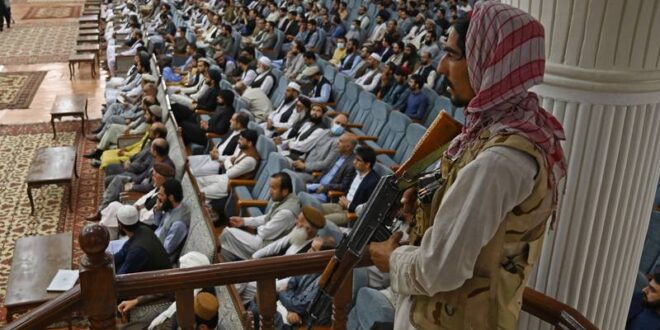A close senior aide to Al Qaeda founder Osama bin Laden has returned to Nangarhar province in eastern Afghanistan two weeks after the Taliban seized control of the country.
A video verified by the The National shows Amin ul-Haq being driven through a checkpoint in the passenger seat of a white four-wheel-drive to a rapturous welcome by supporters.
Ul-Haq, 61, was a major Al Qaeda operative in 1990s, and served as head of bin Laden’s security when he was hiding in the mountains of Tora Bora, close to the Pakistan border, following the 2001 US-led invasion.
He was arrested in Pakistan in 2008 but released in 2011. Before the Taliban takeover of Kabul, he is believed to have worked in the movement’s prisoner commission that worked for the release of detained fighters.
Bin Laden was killed by US commandos on May 2, 2011, in Abbottabad, Pakistan.
Ul-Haq was also a prominent member of Hezb-e-Islami, an Islamist organisation that was founded in Afghanistan in 1970s to fight communism and the then socialist People’s Democratic Party of Afghanistan.
He remains on the US Treasury Department’s list of Specially Designated Global Terrorists.
Michael S. Smith II, a terrorism analyst and expert on extremist groups, said Ul-Haq was “widely perceived as an iconic figure” among religious hardliners who either supported Al Qaeda or were sympathetic to it.
“His [Ul-Haq’s] deliberate public return to Afghanistan is being used by Al Qaeda to portray the group as a strong and durable enterprise – one that is capable of surviving a global war against better-resourced and technologically superior enemies,” Mr Smith told The National.
He said the current events reinforced why it had been and remained “quite problematic for the long-term strategic interests of the United States, all Nato allies, plus many governments in the Middle East and South Asia for the State Department to have declined to designate the Taliban as a terrorist organisation”.
Dr. Amin-ul-Haq, a major al-Qaeda player in Afghanistan, Osama Bin Laden security in charge in Tora Bora, returns to his native Nangarhar province after it fell to the Taliban. Dr. Amin became close to OBL in the 80s when he worked with Abdullah Azzam in Maktaba Akhidmat. pic.twitter.com/IXbZeJ0nZE
— BILAL SARWARY (@bsarwary) August 30, 2021Close ties
Experts have warned that the collapse of the Afghan government would also mean a resurgence of Al Qaeda, which claimed responsibility for the 9/11 attacks on the World Trade Centre and the Pentagon.
And even before the Taliban seized Kabul on August 15, there was never a “divorce” between both entities, says Abdul Sayed, an independent researcher on extremism and politics and security in the Afghanistan-Pakistan region.
“Both are close and sharing deep cordial relations even more than pre-9/11. They are fully supporting one another,” Mr Sayed told The National.
“The Taliban leadership has always responded that they have no obligation per its political settlement with the US that it will not allow Al Qaeda or any other group or individuals in Afghanistan,” he said.
“The Taliban only guaranteed that Al Qaeda would not use the Afghan soil against the US and its allies. Al Qaeda will constitute a strategic depth for the Taliban government in the future.”
Al Qaeda’s central core has been greatly weakened since the US raid that killed bin Laden in 2011, but the terrorist group has created franchises in several regions, mainly Africa, South Asia and the Arabian peninsula.
It is now led by Ayman Al Zawahiri, an Egyptian indicted by the US for the 1998 bombings of the US embassies in Kenya and Tanzania.
US President Joe Biden has defended his decision to withdraw American forces from Afghanistan.
He declared that the US mission in Afghanistan was never nation-building but to defeat Al Qaeda and prevent a terrorist attack on the American homeland.
 Eurasia Press & News
Eurasia Press & News



